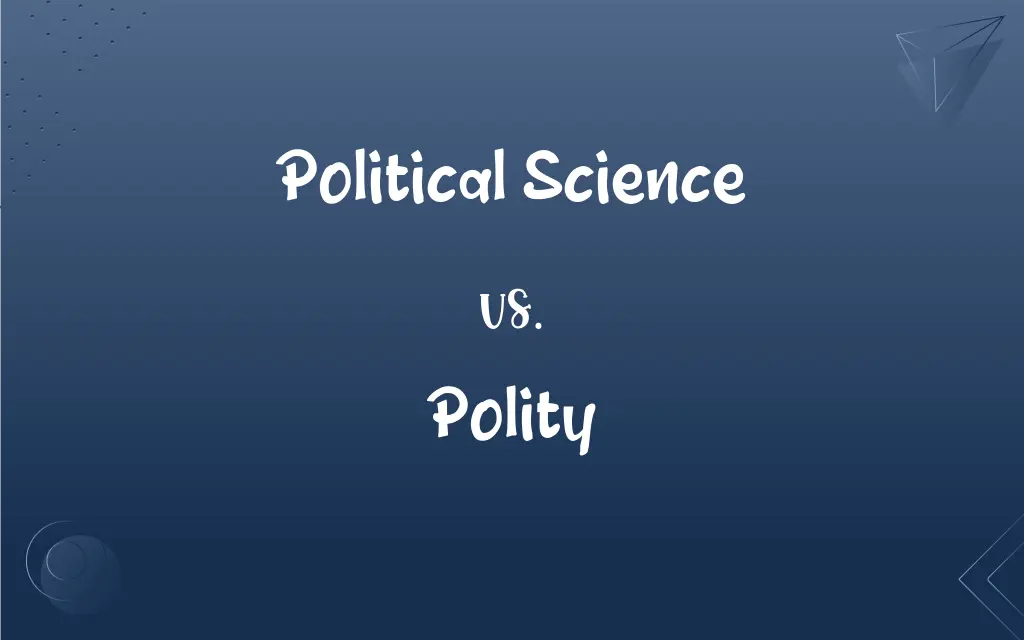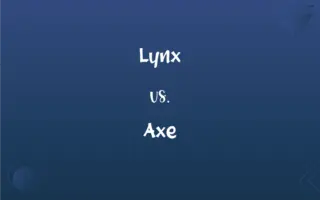Political Science vs. Polity: What's the Difference?
Edited by Aimie Carlson || By Janet White || Published on February 17, 2024
Political science is the academic study of politics and government, while polity refers to a particular form or system of government.

Key Differences
Political science is a social science discipline that analyzes systems of governance, political activities, political thoughts, and political behavior. It examines the theory and practice of politics and describes and interprets political systems and behaviors. Polity, in contrast, refers to a particular form or system of government, the constitution of a political unit, or the way in which a political unit is governed. It is a specific term used to describe a state or society in its structured form.
The scope of political science is broad; it includes the study of political systems, political theories, political institutions, public policies, political processes, and political culture. This discipline applies both qualitative and quantitative methodologies to understand complex political phenomena. Polity, however, is more specific and focuses on the organization and function of a government or political system. It encompasses the structure, organization, and constitution of a government or state.
Political science seeks to understand how political power is distributed and exercised, the role of governments, the behavior of politicians and political parties, and the impact of government policies on societies. It often involves comparative studies of different political systems and ideologies. Polity, on the other hand, is a concept that refers to the concrete structure of a government or political entity, including its constitution, governmental bodies, and the principles guiding its governance.
In political science, theories and models are developed to explain political behaviors and outcomes. It is an academic discipline that contributes to the knowledge and understanding of governance. Polity, in contrast, is a more practical concept, referring to the form and process of government in practice. It is the embodiment of political structures and principles in a society.
Political science contributes to the understanding and development of political systems and can influence political practices. Polity, on the other hand, is the manifestation of these systems and practices within a specific political entity. While political science is analytical and theoretical, polity is practical and structural.
ADVERTISEMENT
Comparison Chart
Nature
Academic discipline analyzing politics and government
Specific form or system of government
Scope
Broad, including systems, theories, institutions, processes
Specific focus on organization and function of government
Methodology
Uses qualitative and quantitative methods
Refers to practical structure and principles
Focus
Understanding and explaining political phenomena
Concrete embodiment of a government system
Outcome and Influence
Theoretical development and influence on political practices
Practical and structural manifestation of political systems
ADVERTISEMENT
Political Science and Polity Definitions
Political Science
Political science is a social science concerned with political affairs.
Political science professors often comment on current political events.
Polity
Polity can mean the constitution of a political unit.
The polity of Canada includes a constitutional monarchy and a parliamentary system.
Political Science
Political science involves the analysis of political systems and theories.
In political science, the concept of democracy is extensively studied.
Polity
Polity can describe the way a political unit is governed.
In a democratic polity, citizens have the right to vote.
Political Science
Political science studies governments, public policies, and political behavior.
Political science majors often become policy analysts.
Polity
Polity refers to a particular form or system of government.
The United States is considered a federal polity.
Political Science
Political science uses research to understand political processes.
Political science research helps in understanding voter behavior.
Polity
Polity encompasses the organization of a government.
Ancient Athens had a direct democracy polity.
Political Science
Political science examines the role and function of government.
Political science courses explore different forms of governance.
Polity
Polity refers to the structured form of a society or state.
The polity of medieval Venice was an oligarchy.
Polity
The form of government of a nation, state, church, or organization.
FAQs
What does polity refer to?
Polity refers to a specific form or system of government or the constitution of a political unit.
Is political science only about government systems?
Political science covers government systems, political activities, theories, and behaviors.
Is polity always about democratic systems?
No, polity can refer to any form of government, including non-democratic systems.
What is political science?
Political science is the study of politics, government systems, and political behavior.
How does political science differ from polity?
Political science is an academic field studying political phenomena, while polity refers to the specific form of a government.
How is political theory related to political science?
Political theory is a significant part of political science, providing frameworks for analyzing political systems.
Are political scientists involved in politics?
Political scientists often analyze politics but may not directly participate in political processes.
Can polity refer to a democracy?
Yes, democracy is a type of polity.
How does polity affect citizens?
The form of polity determines how a society is governed and can significantly affect citizens' rights and responsibilities.
What skills do political science students learn?
Political science students learn critical thinking, analysis, research, and understanding of political systems.
Can a country have multiple polities?
A country can have different levels of polities, like federal and state governments.
Is polity synonymous with government?
Polity is closely related but not always synonymous with government; it refers more to the system or form of governance.
Can polity change over time?
Yes, the polity of a state or society can evolve or change over time.
Does polity include political parties?
Polity encompasses the broader system of governance, which can include the role of political parties.
Do political scientists study international relations?
Yes, international relations is a major area in political science.
Does political science include policy analysis?
Yes, policy analysis is a key aspect of political science.
Is political science important for democracy?
Political science is crucial for understanding and sustaining democratic systems.
Do political scientists predict election outcomes?
Political scientists often analyze and may predict election outcomes based on research and data.
How does polity impact international relations?
The polity of a country can influence its foreign policy and international relations.
Can polity be influenced by culture?
Yes, the polity of a society can be influenced by its cultural values and history.
About Author
Written by
Janet WhiteJanet White has been an esteemed writer and blogger for Difference Wiki. Holding a Master's degree in Science and Medical Journalism from the prestigious Boston University, she has consistently demonstrated her expertise and passion for her field. When she's not immersed in her work, Janet relishes her time exercising, delving into a good book, and cherishing moments with friends and family.
Edited by
Aimie CarlsonAimie Carlson, holding a master's degree in English literature, is a fervent English language enthusiast. She lends her writing talents to Difference Wiki, a prominent website that specializes in comparisons, offering readers insightful analyses that both captivate and inform.







































































